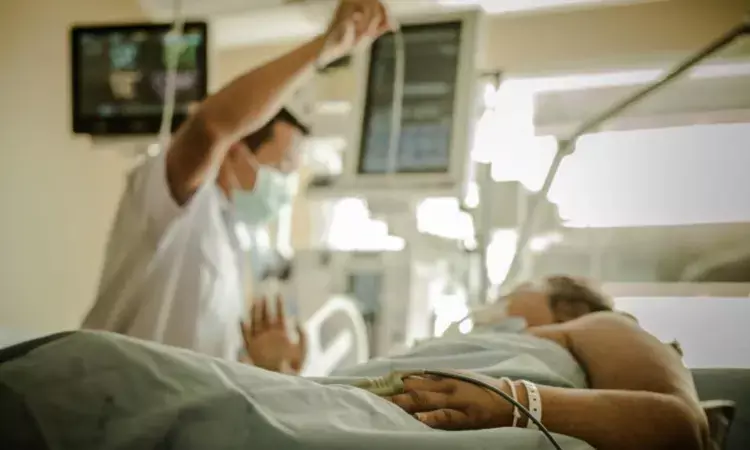- Home
- Medical news & Guidelines
- Anesthesiology
- Cardiology and CTVS
- Critical Care
- Dentistry
- Dermatology
- Diabetes and Endocrinology
- ENT
- Gastroenterology
- Medicine
- Nephrology
- Neurology
- Obstretics-Gynaecology
- Oncology
- Ophthalmology
- Orthopaedics
- Pediatrics-Neonatology
- Psychiatry
- Pulmonology
- Radiology
- Surgery
- Urology
- Laboratory Medicine
- Diet
- Nursing
- Paramedical
- Physiotherapy
- Health news
- Fact Check
- Bone Health Fact Check
- Brain Health Fact Check
- Cancer Related Fact Check
- Child Care Fact Check
- Dental and oral health fact check
- Diabetes and metabolic health fact check
- Diet and Nutrition Fact Check
- Eye and ENT Care Fact Check
- Fitness fact check
- Gut health fact check
- Heart health fact check
- Kidney health fact check
- Medical education fact check
- Men's health fact check
- Respiratory fact check
- Skin and hair care fact check
- Vaccine and Immunization fact check
- Women's health fact check
- AYUSH
- State News
- Andaman and Nicobar Islands
- Andhra Pradesh
- Arunachal Pradesh
- Assam
- Bihar
- Chandigarh
- Chattisgarh
- Dadra and Nagar Haveli
- Daman and Diu
- Delhi
- Goa
- Gujarat
- Haryana
- Himachal Pradesh
- Jammu & Kashmir
- Jharkhand
- Karnataka
- Kerala
- Ladakh
- Lakshadweep
- Madhya Pradesh
- Maharashtra
- Manipur
- Meghalaya
- Mizoram
- Nagaland
- Odisha
- Puducherry
- Punjab
- Rajasthan
- Sikkim
- Tamil Nadu
- Telangana
- Tripura
- Uttar Pradesh
- Uttrakhand
- West Bengal
- Medical Education
- Industry
Spontaneous breathing trial techniques: Pressure support tied to more successful extubations compared with T-piece, study finds

Canada: A systematic review and meta-analysis comprising 6716 critically ill adults and children suggested that pressure support (versus T-piece) spontaneous breathing trials (SBTs) are linked with more successful extubations without increasing the risk of reintubation.
"Patients undergoing pressure support compared with T-piece SBTs were more likely to be extubated successfully and more likely to pass a spontaneous breathing trial if the results of an outlier trial were excluded," the researchers reported in their study published in JAMA Network Open.
About 40% of the time spent on mechanical ventilation is attributed to the weaning process. A randomized clinical trial and a systematic review suggested that weaning protocols shorten the length of stay (LOS) in intensive care units (ICUs), the weaning time, and the duration of mechanical ventilation. Patients typically undergo a spontaneous breathing trial to assess their capacity to breathe spontaneously with little or no support.
Spontaneous breathing trials aid clinicians in minimizing the invasive ventilation duration for patients and stimulate timely discussion regarding readiness for extubation.
Several techniques are commonly used to conduct SBTs, such as continuous positive airway pressure (CPAP), T-piece, automatic tube compensation (ATC; providing flow-dependent ventilator support to overcome the resistance of the endotracheal tube during inspiration and expiration), pressure support (PS) with or without positive end-expiratory pressure (PEEP), and more recently, high-flow oxygen (HFO; offering variable levels of CPAP depending on the flow rate used). However, considerable controversy exists regarding the best spontaneous breathing trial technique to use.
Against the above background, Karen E. A. Burns, Department of Critical Care, St. Michael’s Hospital, Unity Health Toronto, Toronto, Ontario, Canada, and colleagues aimed to summarize trials comparing alternative SBTs.
For this purpose, the researchers searched several online databases from inception to 2023 and 5 conference proceedings (from January 1990 to April 2023). They selected randomized trials directly comparing SBT techniques in critically ill adults or children and reporting at least 1 clinical outcome.
Paired reviewers independently screened citations, abstracted data and assessed quality for the systematic review and meta-analysis using PRISMA guidelines. Data pooling was done using random-effects models. The systematic review and meta-analysis identified 40 trials that included 6716 patients.
Primary outcomes were SBT success, extubation success, and reintubation.
The researchers reported the following findings:
- Low-quality evidence (14 trials [n = 4459]) suggested that patients were not more likely to pass pressure support (PS) compared with a T-piece SBT (risk ratio [RR], 1.04), unless 1 outlier trial accounting for all heterogeneity was excluded (RR, 1.09 [13 trials; n = 3939]; moderate-quality evidence), but were significantly more likely to be successfully extubated (RR, 1.07; 16 trials [n = 4462]; moderate-quality evidence).
- Limited data (5 trials [n = 502]) revealed that patients who underwent automatic tube compensation/continuous positive airway pressure compared with PS SBTs had a significantly higher successful extubation rate (RR, 1.10 [low-quality evidence]).
- Compared with T-piece SBTs, high-flow oxygen SBTs (3 trials [n = 386]) had significantly higher successful extubation (RR, 1.06) and lower reintubation (RR, 0.37 [both low-quality evidence]) rates. Credible subgroup effects were not found.
"These findings suggest that critically ill adults or children undergoing pressure support compared with T-piece SBTs were more likely to pass an SBT and to be extubated successfully," the researchers wrote. "Pressure support SBTs were not linked with an increased risk of reintubation."
"Future investigations should include these findings and compare SBT techniques that maximize differences in inspiratory support," they concluded.
Reference:
Burns KEA, Khan J, Phoophiboon V, et al. Spontaneous Breathing Trial Techniques for Extubating Adults and Children Who Are Critically Ill: A Systematic Review and Meta-Analysis. JAMA Netw Open. 2024;7(2):e2356794. doi:10.1001/jamanetworkopen.2023.56794
Dr Kamal Kant Kohli-MBBS, DTCD- a chest specialist with more than 30 years of practice and a flair for writing clinical articles, Dr Kamal Kant Kohli joined Medical Dialogues as a Chief Editor of Medical News. Besides writing articles, as an editor, he proofreads and verifies all the medical content published on Medical Dialogues including those coming from journals, studies,medical conferences,guidelines etc. Email: drkohli@medicaldialogues.in. Contact no. 011-43720751


